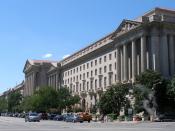In Kingsolver's Animal Dreams, the U.S. government's bad policies and employees are unable to help Codi, the main character, and her hometown's polluted river, and instead their environmental policies lead them to make things in the river worse. The Federal government is again portrayed negatively when Codi's sister Hallie is kidnapped, showing the destruction of the Contras, which the U.S. government supported. Although Hallie's kidnapping is ignored, thanks to a government policy the people of their hometown Grace are able to save their river and farms.
In the late 1980s, a communist government was elected in Nicaragua. They had popular support based on elaborate plans for agrarian reform and an egalitarian distribution of wealth. Arguing that communism in any country was a threat to its national security, the US government supported a group of highly armed rebels, the Contras, in their attacks against Nicaragua's elected regime. In the novel, Codi considers her beloved sister Hallie's move to Nicaragua to participate in the agrarian reform as helping to save the world.
The perspective of the novel supports the cause of the elected Nicaraguan government and condemns the actions of the Contras and US policy.
Grace was a mining town and also where families raised pecan and fruit orchards. Soon the mine started to lose importance; the men turned to the railway for jobs but also kept up their orchards. Now the orchards are showing signs of destruction from the mine's waste. Industry is paired with government institutions to show their lack of attention to the land and its devastating effects. Some of Grace's men trust the government institutions, in their case the Environmental Protection Agency, to remedy the situation. They, unfortunately, can only come up with a 10-year lawsuit by means of lawyers. However, the women are also concerned about the...


